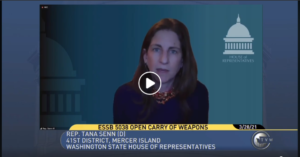Dear Friends and Neighbors,
On Sunday, the House took a vital step in protecting our institutions of democracy and helping ensure the safety of our communities. Senate Bill 5038, which bans the open carry of weapons at permitted public protests and our state capitol, passed the House on a vote of 57-40!
Demonstrations and the capitol campus are public spaces to share ideas and make our voices heard. The open display of firearms only serves to intimidate people sharing these spaces.
“Making one’s point does not require flak jackets, bullet proof vests and long guns. This legislation will protect our ability to continue to rely on words and civil discourse to make change. It is to allow our citizens, our constituents, to come to see us in these hallowed halls, to make their points and opinions clear without fear of intimidation, violence or re-traumatization,” I shared on the House floor during debate. Watch my full remarks.
As the sponsor of similar legislation, House Bill 1234, I was proud to speak in support of this legislation, and remind us all that “in Washington State, our traditions of civil discourse and democracy are incompatible with intimidation.”
House Democrats’ Washington Recovery Budget proposal
Last Friday, House Democrats released our proposed operating budget, the next step in Washington’s plan for community and economic recovery. The Washington Recovery Budget will ensure that the people of Washington, no matter the color of our skin, our background, or how much we earn, will have the support we need to recover together, especially those hit the hardest during this pandemic and who face the most barriers to recovery.
For information about the proposed House capital and transportation budgets, watch for an e-newsletter later this week from my seatmate, Rep. My-Linh Thai.
It has been a rough year and the challenges we face are real: the pandemic’s toll, a housing crisis, vulnerable populations needing more support, a mental health epidemic especially amongst our youth, socially isolated seniors, a racial equity reckoning, parents struggling to provide food, shelter or a warm bed for their children, and more.
I’m proud to support this budget focused on a comprehensive response to COVID-19 and helping individuals, families and small businesses get back on their feet. Furthermore, we cannot let the cost of recovery be borne disproportionately by those at the lowest end of the economic spectrum. This budget says that as we recover, we must recover together and not leave anyone behind.

Investments made in the Washington Recovery Budget include:
- COVID Response and Health Care: $1.185B for COVID vaccines, contact tracing and testing; $100M for local public health districts and regions; $94M for primary care provider rate increases; and $35M for uninsured and underinsured care through federally qualified health centers, rural health centers, and free clinics.
- Economic Recovery: $1.07B for rental assistance to continue the goal of paying the back rent accrued during the Governor’s eviction moratorium; $600M for unemployment insurance tax rate cuts and $250M in small business grants to help get cash out to those businesses who kept their doors closed to protect others; $140.8M in food assistance programs so that families will not go hungry; $63.63M to increase TANF grants and extend benefits; and $121.6M in state housing/homelessness assistance.
- Early Learning and High-Quality Child Care: A doubling of the state’s early learning budget, including $400M in child care grants and supporting providers for language access and navigators; $90M for Working Connections Child Care (WCCC) co-pay reductions and to increase eligibility; $62M for WCCC provider rate increases; $20M for student parents to access child care; $30M to expand Early Childhood Education & Assistance Program (ECEAP) slots and increase rates; and $40M for child care provider health care premium assistance.
- Behavioral Health: $96.7M to fund community providers; $90M to improve crisis response by implementing the 988 national suicide prevention and behavioral health crisis hotline (HB 1477); and $69.38M for substance use disorder treatment and response.
- K-12 Education and Higher Education: $53M for additional special education funding; $52.5M for additional counselors in high poverty schools; Fully funding the Washington College Grant; and $14M in emergency assistance grants that help college students maintain stability so they can finish their programs.
- …and so much more.
I am proud of the investments that this budget makes for residents in our district and across the state. Additional details on the budget can be found in this recent press release or from the House Office of Program Research on leap.leg.wa.gov.
As always, please don’t hesitate to reach out to me this session with your questions, concerns, or comments. We will get through these hardest of times together.
Sincerely,
![]()
Rep. Tana Senn

